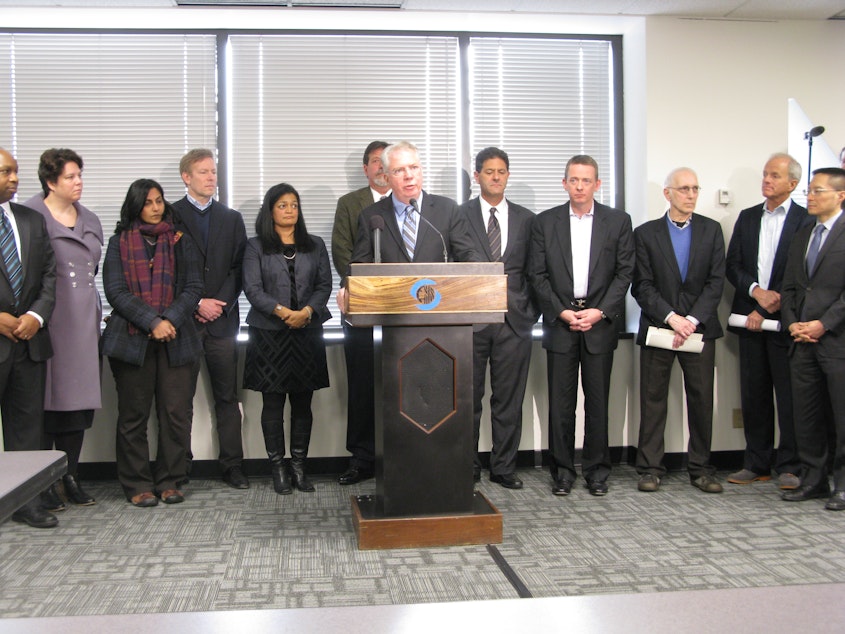Murray Appoints Task Force To Avoid Ballot Initiatives On Minimum Wage

At a press conference on Thursday, Seattle Mayor-elect Ed Murray said Seattle must figure out ways to help low-wage workers, or it risks becoming a city of the rich. He has appointed a task force to study “income inequality,” but no one expects the process to be easy.
The task force includes business groups, hotel and restaurant owners, labor officials, and progressive groups. It also includes people who were on opposite sides of the ballot initiative campaign in SeaTac for a $15 minimum wage.
One of them is City Councilmember-elect Kshama Sawant. She’s been one of the most visible advocates for the $15 minimum wage and said she’s still committed to that position.
When asked if she was concerned about being co-opted by Murray, Sawant responded, “That’s always the concern!” But Sawant also said she decided that if she’s serious about the issue, she should accept Murray’s invitation. “That means engaging with people who don’t agree with me, and making every effort to influence the process,” she said.
Business owners on the task force said they’re making the same promise. “The mayor was very clear that we’re going to speak as one voice. And everyone on the committee is committed to do that,” said Joe Fugere, owner of Tutta Bella Pizzeria. “There will be a process, it will not always be easy, but we’re all in.”
Sponsored
The task force also includes Ivar’s President Bob Donegan, who wrote in Crosscut that the $15 minimum wage initiative in SeaTac was “terrible public policy” and would hurt opportunities for entry-level workers.
Murray said he doesn’t know where the talks will lead, but that the central question is how Seattle can maintain economic and ethnic diversity.
“I think we do agree on one thing,” Murray said, “people should have a wage that’s livable. You can’t have an economy and a business sector that functions off low-wage jobs, that’s not the way to grow business, that’s not the way to create a diverse city.”
Labor officials on the task force point to recent research by the International Monetary Fund and others that income inequality may be harming economic growth in the US.
Dave Freiboth with the King County Labor Council said the problem has been building for years. “I guess we’re kind of slow on the uptake in this country,” he said. “We’ve actually got to get to some real hurt economically before folks will confront the fact that [having] many, many people in low-wage jobs is not good for the economy.”
Sponsored
Murray is asking the task force to issue recommendations by next May. He said they could become the basis for a new minimum wage law to go to the City Council. He made clear that his timeline was intended to avoid costly ballot initiatives if possible. “I do not want the business community and the labor community of this city to spend extraordinary amounts of money on an initiative,” he said.
But some business and labor groups are poised to go to the ballot if the task force doesn’t succeed.
Anti-tunnel activist Elizabeth Campbell has filed a ballot initiative to raise the minimum wage while lowering taxes on business. Her group calls its effort 15in2014.
Sawant said she’ll decide in April whether to campaign for a ballot initiative or stick with the task force. Her advocacy group for the $15 wage is to be called 15Now.org.

